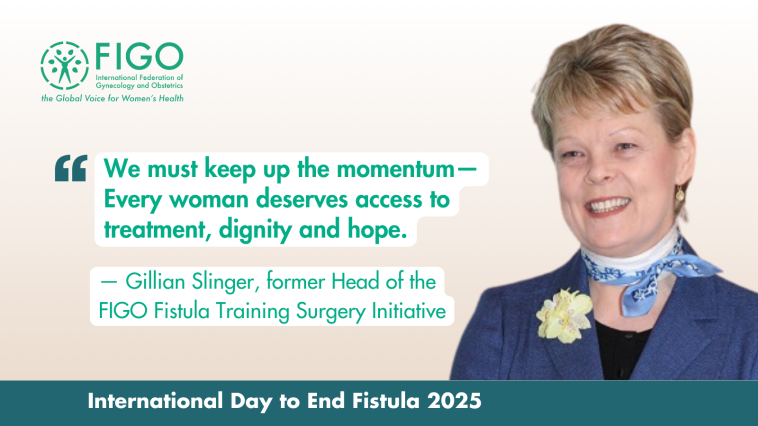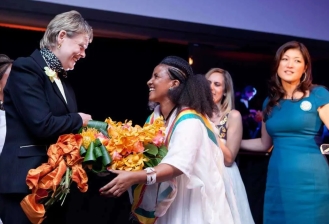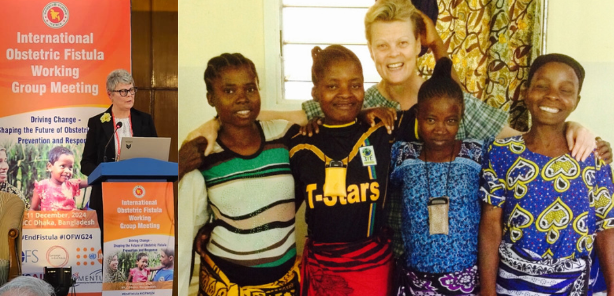Maintaining momentum — Gillian Slinger reflects on two decades fighting obstetric fistula

Gillian Slinger, former Head of FIGO's Fistula Training Initiative for over a decade, began her career as a midwife in the UK and Switzerland. Driven by the stories of hardship she encountered, she pursued further studies in international public health and tropical medicine to better serve in global humanitarian contexts. Her work with Médecins Sans Frontières (MSF) and Save the Children took her across Africa, focusing on maternal health and training. A pivotal moment came when MSF tasked her with launching a fistula treatment project in Abéché, Chad—an experience that sparked a lifelong mission. Now a dedicated international advocate, Gillian reflects on her career and ongoing commitment to women affected by obstetric fistula.
You played a key role in the creation of the International Day to End Fistula —what motivated your efforts, and how has the day helped raise awareness and drive change?
The creation of the International Day to End Fistula (IDEOF) was one of the proudest moments of my life. It is not a celebration, but a solemn call to action every 23 May for the global community to recognise the suffering of women living with this devastating condition. It had long been my dream and with immense effort and the support of leaders like Kate Gilmore, we presented the proposal to the UN General Assembly in New York, which passed the day unanimously.

Since 23 May 2013, the day has grown in visibility and impact, not only in countries most affected by fistula but also globally, with awareness events held in places like Switzerland, Sweden and Canada. Each year, I feel deeply moved, knowing it has brought critical attention to an issue too often hidden. While progress in prevention and care continues, much remains to be done — especially in training skilled midwives, obstetricians and fistula surgeons to ensure every woman has access to the treatment she deserves.
Is there a particular story or experience that has stayed with you over the years?
Nearly 20 years ago, while setting up a project in Chad with MSF, I met a 15-year-old girl suffering from a severe obstetric fistula wearing a distinct yellow shawl. She and her mother had travelled for days from a remote desert village, and despite her pain and poverty, she told me, “Tell my story. I don’t want any of my sisters anywhere to suffer like I have.” Since then, I’ve worn a yellow flower in her honour and dedicated every interview to her and all the "yellow girls" a symbol of solidarity with women and girls living with fistula worldwide. Over the years, I’ve met thousands of extraordinary women, young and old, including Zikira from northern Nigeria, who also developed a fistula aged 15. Though her case was irreparable, we formed a lasting bond. Today, she’s cared for by Musa Isa, a remarkable man who runs an NGO called Fistula Foundation Nigeria and is building a refuge called Hostel Zikira to give special support for women like her. These women continue to inspire me to “shake the fistula tree” for as long as even one of them needs help.

When you joined FIGO’s Fistula Surgery Initiative in 2014 what were the biggest challenges in fistula care globally?
When I joined FIGO’s Fistula Surgery Initiative, one of the greatest challenges was the overwhelming backlog of untreated cases. Many women with obstetric fistula remain hidden, too ashamed of their incontinence to seek help, and while the need was growing, there were far too few surgeons with the specialised skills required. Fistula repair is uniquely complex. Prolonged obstructed labour causes severe internal damage, often leaving women with urinary or rectal incontinence—or both. Each case is different, depending on how the baby’s head compressed the pelvic tissues. The global treatment gap was stark: countless women suffering in silence, isolated in remote areas and tragically, many abandoned by their communities.
FIGO’s programme is essential in tackling this gap by focusing on building local capacity. We identify dedicated surgeons in high-burden countries and train them in the advanced skills needed for successful fistula repair. But technical ability isn’t enough—we look for those who combine surgical excellence with deep compassion, committed to transforming lives over the long term. We also train care teams in holistic support, recognising that fistula recovery goes beyond surgery. Many women experience motor nerve damage and psychological trauma, so rehabilitation, emotional care and restoring dignity is as crucial as closing the fistula itself.
What key milestones or achievements over the past 10 years at FIGO stand out to you?
One of the major milestones in the past decade was the creation of our Expert Advisory Group in 2017, bringing together lead trainers from FIGO centres across Africa, along with experts like Dr Andrew Browning. This group was instrumental in developing the Fistula Surgery Training Manual, published in 2022. Remarkably, during the Covid-19 lockdown, we completed a second edition (based on an earlier version done in 2011)—an encyclopedic guide featuring innovative new medical illustrations that clearly map out complex surgical techniques. These resources have become essential tools in training the next generation of fistula surgeons.
But the greatest achievements lie in what our fellows have accomplished. From celebrating 6,000 fistula repairs in Dubai in 2018, to 10,000 in 2019, 20,000 in 2023, and soon reaching 25,000 — their impact is extraordinary. The most memorable celebration for me was in Addis Ababa during the expert surgical workshop in February 2024, where we celebrated 20,000 repairs collectively performed by the fellows since the start of the programme. One of the proudest moments came at the International Society of Obstetric Fistula Surgeons (ISOFS) conference in December 2024, seeing our fellows — including Dr Sadia from Nigeria, now a lead trainer — stand proudly on stage. Many are now assuming executive posts in ISOFS, shaping the global response to fistula. We’ve built lasting trust with them; they know we’ll always be there, whether it’s for surgical instruments, funding or moral support. This work is far more than a programme — it’s a shared mission, and watching our fellows rise to lead and become change-makers in their own contexts has been the most meaningful experience of my life.
Why is partnership so important in the effort to end obstetric fistula?
Partnership has been essential in driving progress in fistula care, with growing collaboration among organisations like FIGO, Fistula Foundation, ISOFS, MSF and others helping to close the treatment gap. Fistula Foundation, for example, plays a crucial role by covering the full cost of care—including hospital fees, food, medical expenses and transport—making treatment accessible to women who would otherwise be unable to reach it. ISOFS continues to unite and support the global fistula community, and with many other partners, we share a deep commitment to improving access and outcomes.
However, global funding for women’s health is under increasing strain, and many former supporters providing fistula treatment have had to scale back. At the same time, ongoing crises—conflict, epidemics and climate change—mean many women still give birth without skilled care, particularly in remote areas with fragile infrastructure. Stronger coordination and sustained investment are vital, and I remain proud to stand alongside partners as we work to ensure every woman receives the care and dignity she deserves.
What role has FIGO played in shaping global fistula care and policy, and what changes are still needed to eliminate fistula for good?
FIGO has played a pivotal role in advancing fistula care and shaping maternal health policy globally, particularly through its commitment to training obstetricians, gynaecologists and midwives. By fostering collaboration across regions and sharing evidence-based best practices, FIGO has helped build a strong, interconnected global community focused on improving women’s health. The Fistula Surgery Training Initiative has been central to this effort, working in partnership with ministries of health and other stakeholders to expand access to care in countries where many women remain without support. Prevention remains a core focus and continued collaboration with partners like the International Confederation of Midwives (ICM) and the Royal College of Midwives is vital to sustaining international efforts in maternal health and ensuring that women living with fistula are no longer neglected.
Looking ahead, eliminating fistula requires urgent investment in maternal health systems, particularly in low-resource and crisis-affected settings where the condition remains most prevalent. FIGO’s model—supporting locally driven, culturally sensitive care—is crucial for sustainable impact. The initiative empowers surgeons and trainers on the ground to lead policy development and strengthen local capacity, with FIGO providing the platform for them to drive change in their own countries. A powerful example is Dr Abdi from Somalia, who, despite losing fistula clinic funding and facing immense challenges in the past, persisted until he was accepted into the programme. Today, he serves as the Ministry of Health’s National Coordinator and is one of the most dedicated fistula surgeons worldwide. His story captures the essence of FIGO’s approach: enabling local champions to lead life-changing work where it’s needed most.
What message would you like to leave to fistula surgeons and advocates?
We must keep up the momentum. It is unthinkable that a woman could live into old age, suffering from an untreated fistula for decades. We cannot allow that to continue. We must push forward, reach more women, and extend care that is provided by trained, skilled fistula surgeons and teams, especially in underserved areas where there are many cases. Every woman, no matter where she lives, deserves access to treatment, dignity and hope. Though I’ve stepped back from my full-time role at FIGO to focus on a personal project, my commitment to the fistula community remains strong and unwavering. I’ll continue to support fistula hospitals and organisations, as well as to stand alongside those working on the frontlines in the future.
I’m deeply grateful to FIGO, our donors, my wonderful team and the extraordinary network of surgeons, fellows and trainers. We’ve achieved so much — but it’s essential that we maintain the momentum and continue the journey with the fistula community, to reach all women and girls living with the condition and to finally close the global treatment gap.
Test your knowledge on obstetric fistula. Take our International Day to End Obstetric Fistula 2025 Quiz.